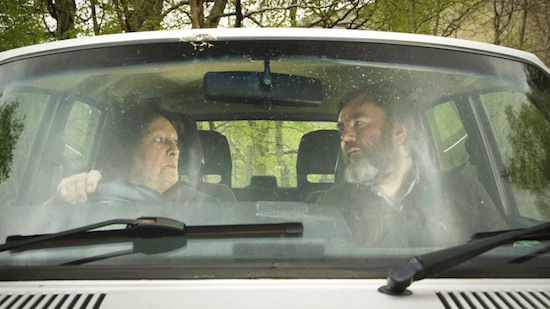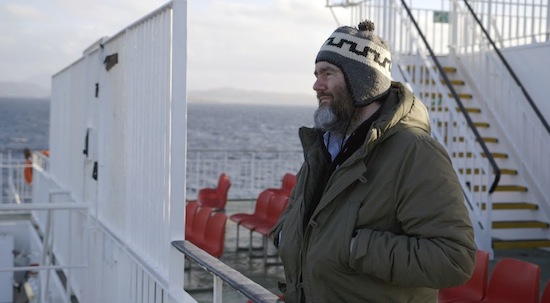In 2014 Aidan Moffat went on a tour of his homeland performing a mix of new material and ancient Scottish folk song. During this period he met the elderly balladeer Sheila Stewart and their relationship forms the central theme of the film Where You’re Meant To Be. He is taking the film (and the show) back on the road starting this week and the album of the same name is released on Friday. He has kindly given us three tracks to play to you here and provided some notes below about the memorable trip.
The Where You’re Meant To Be tour of 2014 saw me and my band travel round Scotland singing old folk songs that I’d mostly rewritten, retaining their meaning but modernising the lyrics, and changing their settings from the country to the city. There were a few originals too, using old melodies that caught my ear, and we filmed the whole thing to use in Paul Fegan’s film of the same name.
The documentary became something much deeper than we expected; what started out as an exploration of Scotland’s tradition ended up being a meditation on death and legacy, but in the funniest possible way. And a great deal of the onscreen humour came from the audience reactions at some of the duff gigs we played in odd, small places that weren’t impressed with my natural brand of thoughtful smut. We played some belters, too, mostly in the cities – Aberdeen, Edinburgh, and the final night in Glasgow’s legendary Barrowland Ballroom were all great – but after a few disheartening, lightly attended and poorly received nights on the more rural legs of the tour, our expectations were running pretty low by the time we reached Drumnadrochit, the hamlet on the banks of Loch Ness, home to Scotland’s favourite fantasy plesiosaur.
But it’s the recording of that show that became an album. After a few studio sessions, I realised that if I wanted to truly capture the spirit of my endeavour, we could only really do a live record, which would also echo some classic folk albums, many of which were recorded with an audience to prove their authenticity. The obvious thing to do (and the original plan) was to mix the Barrowlands show and release that – the audience was about fifteen times the size of the other gigs, for one thing, so my ego would’ve been sated – but, as much as I love the place and was excited to finally play a headline show in such a prestigious venue, there’s already plenty of recordings from the Barras out there, but I’m pretty sure we’ve made the first ever live album recorded in Drumnadrochit Village Hall. And also, simply, it was a great gig; the Drumnadrochit crowd blew us away and reinvigorated the tour. We all loved that night, and if you were part of the audience – and maybe even bought us a pint in the Benleva afterwards – we thank you.
You can listen to three of those Drumnadrochit songs here. As I mentioned above, the idea was to reshape and rewrite the songs, to adapt them to my own life and modernise the content, which of course has been a big tradition in folk music’s history. Here’s what I was thinking.
I’M A ROVER
Scots Glossary (if required)
pump – Fairly self-explanatory, I’m sure: an incredibly photogenic human specimen
randan – An exceptional evening of singular frivolity and favour
An old Scots bothy ballad (though popularised by the Dubliners, so some folk think it’s Irish) about trying to get a shag when you’re drunk. I explain this on the recording, but it bears repeating: I’m not singing about myself here. Disgraceful behaviour.
JOCK McGRAW
The original Jock McGraw – The Stoutest Man in the Forty-Twa – was a figure of fun, a massive hulk of a soldier who’s mistaken for a telegraph pole. When I was beginning to write these songs, there were a lot of stories in the press about Post Traumatic Stress Disorder and the lack of support for returning soldiers suffering from the condition. Apparently, from the men who served in Afghanistan, more have died from suicide at home than did on the battlefield. So my Jock’s story might not end well, but that doesn’t make him any less tough. Indeed, I originally had another verse for this, in which Jock, having sadly taken his own life, wakes up in Hell and meets Satan himself. The Devil’s a bit rude, so Jock knocks him out with a single punch. I scrapped that bit, though, because I felt it trivialised the severity of the rest of the song. It was very much in the spirit of the original, though, and I mention it here as a sort of faintly positive epilogue.

THE PARTING SONG
Scots Glossary (if required)
ned – A crazed, pugnacious dipsomaniac, often enlivened by brown, caffeinated wine
This is the song that dominates the documentary, the rewrite we used to illustrate the conflict and themes of the film. I learned it from a record by folk legend Sheila Stewart, and she absolutely hated my rewrite. She thought I’d misunderstood it, explaining that the original sailing theme in the lyric is actually a metaphor for travelling to the afterlife. I was sceptical about this, and after more research it does seem to be a later interpretation of the song. As far I can tell, the lyrics came from Ireland; the same words are sung over there, but to a completely different tune.
The melody of the Stewart’s version might be a remix of an old whaling song, and to make matters even more confusing, there’s also an Irish song called ‘The Parting Glass’, which is a completely different thing, but the titles often get muddled – there are plenty of recordings of Sheila singing her version of the song which are wrongly named. But it appears the origins of the song might be rooted in sailing after all – or, more accurately, leaving Ireland – and the lyrics travelled over to Scotland with Irish migrants. There is, of course, a strong history of Irish blood in travelling communities, which is where Sheila came from, so I think somewhere down the line this song’s been adapted and given new meaning. Which isn’t to say Sheila was wrong, of course; folk music always evolved, and her version, which she was deeply protective of – and which inspired my own – is as valid as any.
I’m only saying this now because it’s an interesting legacy (I’ve got Irish heritage too), and I didn’t get the chance to talk to her about it in person; I found all this out after the tour, and she died before I had the chance to meet her again. If you’ve seen the film, you’d be forgiven for thinking we really didn’t get along, but although we certainly disagreed about music, there were also quieter moments when we had a good laugh; Sheila was a formidable woman, but she was funny too. I’d dedicate this song to her – indeed, I’d dedicate the whole album to her – but for the fact that she really, really didn’t like it. So all I’ll say is, although I don’t believe in Heaven or spiritual nautical metaphors, I hope she had a calm and comfy voyage.
Aidan Moffat Tour
March 25 – Aberdeen, Belmont Cinema
March 26 – Cullerlie, Farm Park
March 27 – Dundee, DCA
March 31 – Skye Portree, Aros Hall
April 1 – Drumnadrochit, Village Hall
April 2 – Oban, Phoenix Cinema
April 3 – Bo’ness, Hippodrome
April 6 – Kirkcaldy, Adam Smith Theatre
April 8 – Blairgowrie, Town hall
April 9 – Edinburgh, Filmhouse


